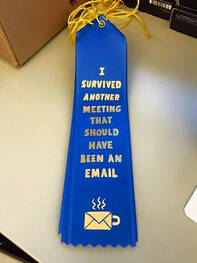 In my lifetime I don't know if I can name anyone who got really excited about meetings. I think most of us look at meetings the same way we do a trip to the dentist: it's for our good and we need them, but the happy gas (or donuts in the meeting) is the highlight. But it's possible to make meetings enjoyable. I'd argue that our cynicism towards meetings is because the overwhelming experience we've had in meetings has been negative. They've been led poorly. They went nowhere. They never ended. And worse, they could have been an email. If you want to lead meetings well, I want to give five suggestions 1. Start (and End) on Time - Most of the time we spend the opening parts of our meetings catching up or small talking. There's nothing wrong with that. We need to build relationships and strengthen chemistry with the people around us. But that happens outside the meeting time. If your meeting starts at 10, start at 10. If it's scheduled to end at 11, it ends at 11. I've heard of CEOs using a kitchen timer to set the time limits for their meetings. We want to be mindful of people's time, and respectful of their attention during our meetings. 2. Use Memos (or Emails) - It's anecdotal, but 75% of the time I've spent in meetings in my life could have been sent as an email. If there is information to be passed on, do that in an email. Don't take time in meetings to talk about things that could be shared in an email. Use the time in meetings for things that require the meeting. Memos/Emails are a great way to get calendar dates, reminders, etc. out quickly. 3. Have an Agenda - The scariest meeting is the meeting without a plan. It's like handing a bunch of toddlers markers in a freshly painted room. You're asking for trouble. Agendas provide structure, direction, and road markers for your meeting. Agenda items are prepared and initiated in advance. And the agenda is sent out before the meeting so people know what to expect. 4. Solicit Input - One thing meetings allow that emails don't is that you have all the key decision makers and leaders in the same room. Get their input and feedback in the meeting. Don't turn meetings into benevolent dictatorships where you dispense things and expect approval. Meetings that solicit input turn conversational, foster collaboration, and create a stronger team atmosphere. 5. Have an Action Plan - At the end of the meeting, there should be a very clear plan of what happens next. Clear action items should be agreed upon, delegated to the right people, and a system of accountability & follow-up should be put in place. No meeting should ever end with inaction. If it does, you've wasted your time (and everyone else's). These are written really generic, but let's think about particular application to the local church. How can pastors & ministry leaders effectively lead meetings? What do you do in your meetings to lead better meetings?
0 Comments
Leave a Reply. |
Scott M. DouglasA blog about leadership and the lasting legacy of family ministry. Archives
August 2023
Categories
All
|
 RSS Feed
RSS Feed



